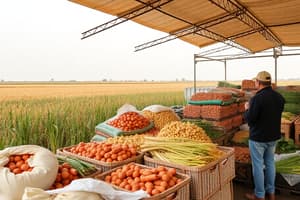Podcast
Questions and Answers
What is the primary goal of agricultural marketing in agriculture extension?
What is the primary goal of agricultural marketing in agriculture extension?
- To enhance food security
- To reduce production costs
- To increase farmers' income and profitability (correct)
- To improve agricultural productivity
Which of the following is NOT a key component of agricultural marketing?
Which of the following is NOT a key component of agricultural marketing?
- Farm Management (correct)
- Pricing
- Product Development
- Market Research
What is the main objective of product development in agricultural marketing?
What is the main objective of product development in agricultural marketing?
- To reduce production costs
- To improve agricultural productivity
- To increase farmers' income
- To meet market demands and consumer preferences (correct)
Which agricultural marketing strategy involves selling products directly to consumers?
Which agricultural marketing strategy involves selling products directly to consumers?
What is the primary objective of market research in agricultural marketing?
What is the primary objective of market research in agricultural marketing?
Which of the following is an advantage of cooperative marketing?
Which of the following is an advantage of cooperative marketing?
What is the primary objective of pricing in agricultural marketing?
What is the primary objective of pricing in agricultural marketing?
Which agricultural marketing strategy involves selling products in bulk to intermediaries?
Which agricultural marketing strategy involves selling products in bulk to intermediaries?
What is the primary objective of distribution in agricultural marketing?
What is the primary objective of distribution in agricultural marketing?
Which of the following is NOT an objective of agricultural marketing?
Which of the following is NOT an objective of agricultural marketing?
Flashcards are hidden until you start studying
Study Notes
Agricultural Marketing in Agriculture Extension
Definition and Importance
- Agricultural marketing refers to the process of planning, organizing, and executing the conception, pricing, promotion, and distribution of agricultural products.
- It plays a crucial role in agriculture extension as it helps farmers to sell their products at competitive prices, increasing their income and improving their livelihoods.
Objectives
- To enhance the marketability of agricultural products
- To increase farmers' income and profitability
- To improve the efficiency of the agricultural marketing system
- To provide consumers with quality products at competitive prices
Key Components
- Market Research: gathering and analyzing data on market trends, consumer preferences, and competitors to identify opportunities and challenges.
- Product Development: developing new products or improving existing ones to meet market demands and consumer preferences.
- Pricing: determining the optimal price for agricultural products based on production costs, market conditions, and consumer willingness to pay.
- Promotion: using various techniques such as advertising, sales promotions, and public relations to increase awareness and sales of agricultural products.
- Distribution: managing the logistics of getting agricultural products from the farm to the consumer, including transportation, storage, and handling.
Agricultural Marketing Strategies
- Direct Marketing: selling products directly to consumers through farmers' markets, roadside stands, and online platforms.
- Wholesale Marketing: selling products in bulk to intermediaries such as wholesalers, distributors, and processors.
- Cooperative Marketing: farmers working together to market and sell their products, sharing resources and risks.
- Contract Marketing: farmers entering into contracts with buyers to supply products at a fixed price and quantity.
Challenges and Opportunities
- Challenges: inadequate market infrastructure, lack of access to market information, and limited bargaining power of farmers.
- Opportunities: increasing demand for organic and specialty products, growth of e-commerce and online marketplaces, and potential for value addition and processing.
Agricultural Marketing in Agriculture Extension
Definition and Importance
- Agricultural marketing is the process of planning, organizing, and executing the conception, pricing, promotion, and distribution of agricultural products.
- It helps farmers sell their products at competitive prices, increasing their income and improving their livelihoods.
Objectives
- Enhance the marketability of agricultural products
- Increase farmers' income and profitability
- Improve the efficiency of the agricultural marketing system
- Provide consumers with quality products at competitive prices
Key Components
Market Research
- Gathering and analyzing data on market trends, consumer preferences, and competitors to identify opportunities and challenges
Product Development
- Developing new products or improving existing ones to meet market demands and consumer preferences
Pricing
- Determining the optimal price for agricultural products based on production costs, market conditions, and consumer willingness to pay
Promotion
- Using various techniques such as advertising, sales promotions, and public relations to increase awareness and sales of agricultural products
Distribution
- Managing the logistics of getting agricultural products from the farm to the consumer, including transportation, storage, and handling
Agricultural Marketing Strategies
Direct Marketing
- Selling products directly to consumers through farmers' markets, roadside stands, and online platforms
Wholesale Marketing
- Selling products in bulk to intermediaries such as wholesalers, distributors, and processors
Cooperative Marketing
- Farmers working together to market and sell their products, sharing resources and risks
Contract Marketing
- Farmers entering into contracts with buyers to supply products at a fixed price and quantity
Challenges and Opportunities
Challenges
- Inadequate market infrastructure
- Lack of access to market information
- Limited bargaining power of farmers
Opportunities
- Increasing demand for organic and specialty products
- Growth of e-commerce and online marketplaces
- Potential for value addition and processing
Studying That Suits You
Use AI to generate personalized quizzes and flashcards to suit your learning preferences.



